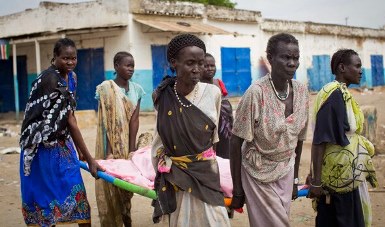IOM says it responds to plights of IDPs in South Sudan’s Malakal camp
March 11, 2016 (JUBA) – The International Organization for Migration (IOM) said it has embarked on providing shelters and other basic necessities to tens of thousands of internally displaced persons (IDPs) taking refuge in the United Nations manned protection of civilians (PoC) site in the Upper Nile’s state capital, Malakal.

“Before the rains begin, damaged areas must be repaired in order for IDPs to return and relief services to resume. At the same time, efforts should start immediately to develop additional areas to provide acceptable living conditions and reduce overcrowding,” said Anders Haugland, IOM’s Malakal Head of Sub-Office, in a statement emailed to Sudan Tribune on Friday.
“Even before the February attack, at least 36,000 IDPs already lived in severely congested areas due to space constraints,” the IOM official further explained.
The organization’s head in Malakal’s office further lamented on the prevailing situation in the area, with further worries that it may deteriorate unless action was taken to arrest it.
Fighting which erupted on 17 February 2016, forced most IDPs to flee their shelters to areas of the United Nations Mission in South Sudan (UNMISS) base perceived to be safer but not suitable for accommodating thousands of IDPs.
At least 25 people died during the attack and more than 120 were injured, according to the IOM’s statement.
Over 30,000 people are now living in makeshift shelters. The area is extremely crowded, with an average of only 2.5 square metres of living space per person. Congestion is leading to poor sanitation and increasing the risk for the spread of disease.
After a devastating rainy season in 2014, IOM led a massive expansion of the site to improve living conditions and IDPs access to relief services. Now that IDPs have fled these areas, it said, humanitarian workers fear a repeat of 2014, when thousands lived in knee-high water and waterborne diseases were rampant.
IOM said it has taken swift action to provide safe drinking water to more than 40,000 IDPs. For instance, on the second day of fighting in Malakal, one staff risked his life to walk 2 kilometres, after dark and without protection, to IOM’s water-pump system at the White Nile River to ensure that water continued to flow to the PoC site.
The organization also said it is constructing latrines and conducting hygiene promotion to minimise the impact of crowded conditions on the health of children and their families. Its primary health care clinic, the statement said, including a new maternity ward, was burned to the ground during the attack and had to open a temporary clinic, offering full primary health care services and maternal care.
IOM’s shelter partner in Malakal is the Danish Refugee Council (DRC); which is also the camp manager. IOM is working closely with all agencies to provide support to IDPs and ensure proper shelter.
Also, “DRC implements shelter construction at the PoC site in Malakal, stressed Ashley McLaughlin, in an email sent to Sudan Tribune.
Last week, it said, its medical staff saw nearly 2,300 patients and delivered nine babies.
Most IDPs fled the fighting with little-to-no belongings, many with literally only the clothing on their backs. One such IDP, Nyarok, a young mother of four, is living with her relatives and children in two tents cobbled together with IOM plastic tarp, poles and sheets.
Despite immense needs, when asked what she wanted most, Nyarok said “we only want our people to live in peace.”
While warring parties in South Sudan signed a peace deal in August 2015 to end 21 months of civil war, its implementation has been shaky as many obstacles continue to impede on the realization of the deal.
(ST)
